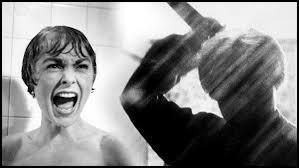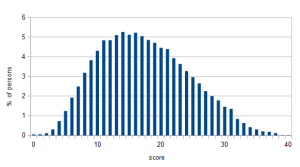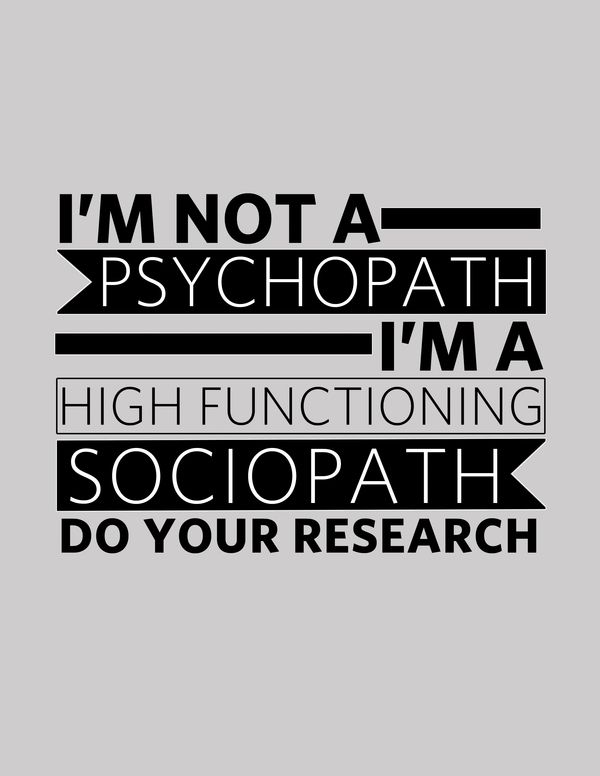 The word “psychopath” conjures images of fictional psychos like Norman Bates, Hannibal Lecter, and Annie Wilkes, as well as reality monsters such as Ted Bundy, John Wayne Gacy, and Eileen Wuornos. However, proven clinical studies show 3% of the world’s population have psychopathic psychological profiles—most being men. Surprisingly, few are actually violent. But they’re out there… all around you… and they’re hiding in plain sight.
The word “psychopath” conjures images of fictional psychos like Norman Bates, Hannibal Lecter, and Annie Wilkes, as well as reality monsters such as Ted Bundy, John Wayne Gacy, and Eileen Wuornos. However, proven clinical studies show 3% of the world’s population have psychopathic psychological profiles—most being men. Surprisingly, few are actually violent. But they’re out there… all around you… and they’re hiding in plain sight.
Psychopaths aren’t specifically defined under the American Psychiatric Association’s Diagnostic and Statistical Manual Five, (DSM-5) which is the profession’s bible when it comes to profiling abnormal behavior. Psychopathy and it’s alter-ego, sociopathy, are jointly classified as Antisocial Personality Disorders and are diagnosed according to specific behaviors.
 Part of identifying a psychopathic character is applying the 40 Point Revised Psychopathy Checklist (PCL-R) which is a categorical diagnosis developed by psychologist, Dr. Robert Hare, who studied prison inmates. It indicates a psychopathic personality through a psychometric dimensional score. It’s a recognized process for legal, clinical, and research purposes. Interestingly, a version of the Psychopathy Checklist is available online and I’ve linked it for you. Take it. I’m curious if you’re more psychopathic than me. I tried the test—and I’ll show you my score—if you stick reading this article.
Part of identifying a psychopathic character is applying the 40 Point Revised Psychopathy Checklist (PCL-R) which is a categorical diagnosis developed by psychologist, Dr. Robert Hare, who studied prison inmates. It indicates a psychopathic personality through a psychometric dimensional score. It’s a recognized process for legal, clinical, and research purposes. Interestingly, a version of the Psychopathy Checklist is available online and I’ve linked it for you. Take it. I’m curious if you’re more psychopathic than me. I tried the test—and I’ll show you my score—if you stick reading this article.
But before you go ahead and answer the forty question, true-or-false test, let’s look at the parameters of abhorrent behavior and how it applies to whether or not you’re psychopathic.
The DSM-5 recognizes six general personality disorders:
- Borderline
- Avoidant
- Narcissistic
- Obsessive-Compulsive
- Antisocial
- Schizotypal
Quoting directly from the DSM-5:
 The essential features of a personality disorder are impairments in personality (self and interpersonal) functioning and the presence of pathological personality traits. To diagnose antisocial personality disorder, the following criteria must be met:
The essential features of a personality disorder are impairments in personality (self and interpersonal) functioning and the presence of pathological personality traits. To diagnose antisocial personality disorder, the following criteria must be met:
Significant impairments in personality functioning manifest by:
1. Impairments in self-functioning (a or b):
(a) Identity: Ego-centrism; self-esteem derived from personal gain, power, or pleasure.
(b) Self-direction: Goal-setting based on personal gratification; absence of prosocial internal standards associated with failure to conform to lawful or culturally normative ethical behavior.
AND…
2. Impairments in interpersonal functioning (a or b):
(a) Empathy: Lack of concern for feelings, needs, or suffering of others; lack of remorse after hurting or mistreating another.
(b) Intimacy: Incapacity for mutually intimate relationships, as exploitation is a primary means of relating to others, including by deceit and coercion; use of dominance or intimidation to control others.
Pathological personality traits in the following domains:
 1. Antagonism, characterized by:
1. Antagonism, characterized by:
(a) Manipulativeness: Frequent use of subterfuge to influence or control others; use of seduction, charm, glibness, or ingratiation to achieve one’s ends.
(b) Deceitfulness: Dishonesty and fraudulence; misrepresentation of self; embellishment or fabrication when relating events.
(c) Callousness: Lack of concern for feelings or problems of others; lack of guilt or remorse about the negative or harmful effects of one’s actions on others; aggression; sadism.
(d) Hostility: Persistent or frequent angry feelings; anger or irritability in response to minor slights and insults; mean, nasty, or vengeful behavior.
2. Disinhibition, characterized by:
 (a) Irresponsibility: Disregard for – and failure to honor – financial and other obligations or commitments; lack of respect for – and lack of follow through on – agreements and promises.
(a) Irresponsibility: Disregard for – and failure to honor – financial and other obligations or commitments; lack of respect for – and lack of follow through on – agreements and promises.
(b) Impulsivity: Acting on the spur of the moment in response to immediate stimuli; acting on a momentary basis without a plan or consideration of outcomes; difficulty establishing and following plans.
(c) Risk taking: Engagement in dangerous, risky, and potentially self-damaging activities, unnecessarily and without regard for consequences; boredom proneness and thoughtless initiation of activities to counter boredom; lack of concern for one’s limitations and denial of the reality of personal danger.
Overall factors to consider:
 The impairments in personality functioning and the individual‟s personality trait expression are relatively stable across time and consistent across situations.
The impairments in personality functioning and the individual‟s personality trait expression are relatively stable across time and consistent across situations.- The impairments in personality functioning and the individual‟s personality trait expression are not better understood as normative for the individual‟s developmental stage or sociocultural environment.
- The impairments in personality functioning and the individual‟s personality trait expression are not solely due to the direct physiological effects of a substance (e.g., a drug of abuse, medication) or a general medical condition (e.g., severe head trauma).
- The individual is at least age 18 years and shows an established history of juvenile conduct disorder.
So the DSM-5 clearly lays out what constitutes Antisocial Behavior Disorder. But we’re used to hearing the terms “Psychopath” and “Sociopath”. Is there a difference?
Non-clinically, yes. The best description seems to be that psychopaths are born and sociopaths are made. It’s a nature versus nurture debate. Innate versus learned behaviors.
Psychopaths and sociopaths are both social predators and share the same characteristics of lack or empathy, remorse, or guilt. They don’t take responsibility for their own actions. They disregard social norms and conventions. Laws are for others. They incline towards violence. And, to their core, they’re manipulative and deceitful.
 Sociopaths generally come from the lower elements in life—poor socio-economic families, poor education, poor health with addiction issues—and they’re highly impulsive, not inclined to plan-out events nor to exhibit much patience. Sociopaths are usually loners with miserable attitudes and are ostracized by society—mostly unemployable. Their emotional level is primitive and they have little fear with the exception of personal injury and dying. Sociopaths can be thought as rudimentary or undeveloped psychopaths that want little to do with society.
Sociopaths generally come from the lower elements in life—poor socio-economic families, poor education, poor health with addiction issues—and they’re highly impulsive, not inclined to plan-out events nor to exhibit much patience. Sociopaths are usually loners with miserable attitudes and are ostracized by society—mostly unemployable. Their emotional level is primitive and they have little fear with the exception of personal injury and dying. Sociopaths can be thought as rudimentary or undeveloped psychopaths that want little to do with society.
Psychopaths, on the other hand, are much more intelligent and mix well in society. They’re  usually educated and employed—some holding high degrees, responsible positions, and even elected office. They are generally much healthier than sociopaths and not as prone to substance abuse. Psychopaths are cunning. They’ll plan to the tiniest detail when committing crimes or deceiving others. They’re completely aware of what they’re doing and it’ll always be in their interest, with a focus on minimizing risk to themselves. Psychopaths are slightly more emotional than sociopaths, however these emotions are the destructive ones of hate, disgust, contempt, and revenge.
usually educated and employed—some holding high degrees, responsible positions, and even elected office. They are generally much healthier than sociopaths and not as prone to substance abuse. Psychopaths are cunning. They’ll plan to the tiniest detail when committing crimes or deceiving others. They’re completely aware of what they’re doing and it’ll always be in their interest, with a focus on minimizing risk to themselves. Psychopaths are slightly more emotional than sociopaths, however these emotions are the destructive ones of hate, disgust, contempt, and revenge.
It’s said that in the game of life, psychopaths know what cards you’re holding, and they cheat.
 So, are you ready to see where your personality fits on the bell-curve chart of psychopathy? Here are the 40 standard questions on the PCL-R that must be answered either true or false as it applies to you. There’re no “in-betweens”, “kindas”, or “sort-ofs”. It’s black or white. To have your psychopathic traits scored, go to the online site at http://vistriai.com/psychopathtest/. Click Here
So, are you ready to see where your personality fits on the bell-curve chart of psychopathy? Here are the 40 standard questions on the PCL-R that must be answered either true or false as it applies to you. There’re no “in-betweens”, “kindas”, or “sort-ofs”. It’s black or white. To have your psychopathic traits scored, go to the online site at http://vistriai.com/psychopathtest/. Click Here
The Psychopath Test
What is your age?
What gender do you identify as?
__ Man.
__ Woman.
Mark each of the items below as true or false when applied to you.
1. I never, never get tongue-tied.
__ True __ False
2. In important ways, I am superior to most people.
__ True __False
3. I am prone to boredom.
__ True __False
4. I lie to make things go smoother.
__True __False
5. I cheat people out of things.
__True __False
6. I rarely feel guilty.
__True __False
7. I am an emotional person.
__True __False
8. I rarely connect emotionally with others.
True. False.
9. I often get others to pay for things for me.
__True __False
10. I am impatient.
__True False
11. I am promiscuous.
__True __False
12. I was a problem child.
__True __False
13. I have difficulty staying committed to long term goals.
__True __False
14. I am impulsive.
__True __False
15. I frequently perform sloppy work.
__True __False
16. I try to evade responsibility.
__True __False
17. My romantic relationships usually fall apart quickly.
__True __False
18. I committed some crimes as a juvenile.
__True __False
19. I have violated a probation order.
__True __False
20. I have committed many types of crimes.
__True __False
21. I am neither shy nor self-conscious; I speak with authority.
__True __False
22. I am exceptional.
__True __False
23. I need to take risks to feel alive.
__True __False
24. I am basically an honest person.
__True __False
25. I feel bad when I trick people.
__True __False
26. If someone deserves it, I don’t feel too bad.
__True __False
27. I think strong emotions are for the weak.
__True __False
28. I think if people get offended, that is their problem.
__True __False
29. I have always taken care of myself.
__True __False
30. I never act hastily.
__True __False
31. I think sex should not be taken lightly.
__True __False
32. I was often in trouble at school.
__True __False
33. I lack direction in my life.
__True __False
34. I never give in to temptation.
__True __False.
35. I always keep my word.
__True. __False
36. My problems are mostly the fault of others.
__True __False
37. I don’t like to commit in relationships.
__True __False
38. I was a bully in high school.
__True __False
39. I have been held in contempt of court.
__True __False
40. I am not or would not be proud of getting away with crimes.
__True __False
Again, to take the test online and have it scored, go to http://vistriai.com/psychopathtest/. Click Here
Don’t be worried unless you scored 25. That’s the threshold for psychopathy. Anything over 30—you should be seriously concerned. And above 35, you’re in the company of greats. Eileen Wuronos scored 35. John Wayne Gacy was 36. Canadian superstars Paul Bernardo and Clifford Olson were 37 and 38, respectively. Little known USA serial killer Peter Lundin got a 39. And Theodore Bundy aced it. 40 outa 40.



30 I had to take a psych profile years ago for a job I had accepted. It was quite a bit longer and also rated honesty and integrity among other things. At that time I was actually diagnosed a High Functioning Sociopath with an IQ of 142.
The things that keep life exciting hey. Personally though, I think the worst thing you can do is give people a label to live up or down to.
Interesting comment, Jim. Living up or down to other opinions are labels 🙂 Thanks for stopping by and giving your insight!
30. Not surprising. Ask away I guess. I don’t have any reason to lie to you seeing as I highly doubt anyone I know will be reading this.
I appreciate your honesty and respect your anonymity 🙂 With a 30, I’m not sure if we should meet.
I scored 31. find it more difficult to believe that someone can have a very low score than to believe there are people (like myself) are on the other end of the spectrum. Which really tells me as much about my sociopathic tendencies as the quiz itself did ha
Maybe I’m the strange one 🙂 Thanks for commenting, Amy.
I agree completely. My girlfriend took it and scored an 8 and I just kind of looked at her.. It seems unreasonable that so many people could score so low. I sent this to my brother and he scored a 19, which is much more believable. My personal opinion is just that people aren’t honest enough for these types of quizzes.
I’m not sure why you say that. It seems Antisocial Personality Disorder has a way worse rep than it really deserves. Like with any group, you can’t blame the many for the actions of a few. Every person has their own identity, and while I may not feel bad for stealing something or when people around me die, I’m not a killer. I would never want to go to jail. Anyone who ends up there has done it out of their own stupidity. I’m extremely calm in 90% of situations, and although money is a major motivator for me, I’d never kill for it.
I personally don’t see any reason for someone to fear me. Most of my manipulation is done where both people benefit, or at least feel like they are. So no harm no foul.
Interesting article, I took the test and got a 22, I haven’t been clinically diagnosed of anything but then again I haven’t gone to get checked. I’m not surprised though I know I’m different than most people around me, just in the way I think and how I operate in various social situations. I am very aware of myself and many other things that are happening in a social situation and I’m calculating what is happening at all times. And when I’m fed up or bored of observing and forming stories, at the earliest opportunity I’ll exit quietly.
Like the previous poster Sabrina, I’m educated, successful, charming, talented, athletic, a great public speaker, some would consider me good-looking, but after a conversation most would consider me attractive. But it’s for those reasons why I see myself as different, I don’t own a violentl or murderous bone in my body and have very strong intolerance towards injustice.
So I wonder if some of those main qualities that caused me to score higher than the average mean another personality trait is at work that employs those same tendencies, but for good rather than malicious purposes.
Interesting comment, Chase. I think the test is somewhat subjective and many qualities that make people extroverts and very self-confident will push the rating up. I think these traits work to your advantage – I wouldn’t worry about the score number – just keep on doing what works for you 🙂 Thanks for commenting!
Sorry for the phone typo- want to clarify I meant to write “I go out of my way NOT to hurt others”
Thanks for sharing this, Sabrina. I thought that was a typo or otherwise you really might be a psychopath 🙂
I scored a 4! 🙂
Welcome to the single digit club, Lauralynn 🙂 Thanks for sharing!
Hi Garry,
Count on you to post the most interesting, and eye-brow raising, articles :D.
I scored a 5, don’t know if that makes me stable, or boring LOL. So happy to have a new computer to read your posts (I have much catching up to do). Hope you have a relaxing day. Cheers my friend. ☼
Hi Sandy! So great to hear from you! I hope things are settled down on your end and that you’re back in the writing game 🙂 Actually, from what I see of the graph, a 5 is abnormal – to the good side. As you see from the comments here (and a bunch on Facebook) most are reporting pretty low scores. One said she got a 26 but I think she was pulling my leg 🙂 14-16 is the average range on the graph but then I’m not sure who the demographic is. The checklist developer started with testing prison inmates so maybe 14-16 is the average inmate score and that we who score down around five are just average Joes 🙂 Thanks for commenting & so nice to hear from you!
Well, Garry, you’re looking for those who scored a bit higher on the test; I received a 16. Still not close enough to think about being worried, but enough to be somewhat concerned with how my thinking mind works. I have issues, of course, but work on dealing with them. Most of my answers to which I scored points on were more leaning towards being against myself with my thoughts or behaviors. My empathy has always been at a very high level when thinking or dealing towards others, which I feel is the best indicator of not ranging towards any sort of anti-social feelings. Were I a serial killer I think my first victim would be myself! If all serial killers would only act with this direction! Makes me a good horror writer, anyways! Another great article! I’ll try not to be too scary if we ever meet! lol
Hi Dean! Thanks for being so candid. You’re right about the test making you think how the mind works. All the questions were very clear, nothing tricky, but I found it hard to be black and white on some. A 16 is nothing to be concerned about. The graph shows it to be right in the average. I’m not worried about you being too scary considering some of the people I’ve met 🙂 God stuff for being a horror writer. I wonder how Stephen King would score?
Hi Garry, interesting test! I scored a 4! 🙂 Like Anita above, that’s the first time I’ve ever taken a test like that! 🙂
Another low score being reported 🙂 Hmmm… haven’t heard from a few of the usual DyingWords suspects. I wonder if some are in the average range which, from the bell curve, looks to be 14-16 and they’re not willing to fess up. Thanks for commenting and sharing your score, Lyn!
Love this post, Garry! I scored a 39…hope that’s okay. Almost aced it! I’m kidding, of course. I got a 5. But I also checked the box for true next to “those who deserve it.”
I knew there was a difference between sociopath and psychopath, but didn’t realize it was as simple as nature vs. nurture. Makes sense, though.
Yeah, after reading “MARRED” I figgered you’d be in the high 30’s, Sue. Takes one to know one, right 🙂
I got an 11, and frankly am surprised I didn’t score higher. I have been diagnosed as having borderline personality disorder, among other things. Given your explanations above, I’d say I was more on the sociopathic line – due to being raised by a woman who would have scored well above 30 on that same test. When I became interested in reading true crime, and then all this information and research started being done and being available to the public, I saw she really fitted the profile. At that time I told the therapist I was seeing and he poohpoohed it because “they all end up in jail for something sooner or later”. It’s nice to see that we are finally acknowledging that many of them live perfectly well in society, often considered successful people (she was) but trust me, you don’t want to marry one of them let alone cross them. Thank you for the clarification – I’ve been seeing both terms bandied about quite a bit lately, and was under the impression that sociopath was “done” and now rolled into the one category of psychopath. Apparently that is not correct. Your definitions make perfect sense as there is a definate division between those who are cold, intelligent and calculating and others who are so ruled by impulse. Interesting article – thank you.
Thank you so much for sharing this, Summer. This takes real courage to talk about your upbringing and personality so honestly. I also thought psycho and socio were wrapped together but, clearly, not so. I read there’s a move within the American Psychiatric Association to re-classify Antisocial Behavioral Disorder into two separate groups to reflect the “born” and “made” categories. Again, thanks so much for commenting. Very interesting perspective!
Hi Garry,
Fun test. I scored 6, but there are some that I waivered on, like number 26. Let’s be clear, I can be heartless when I think someone deserves something. If you kill someone (murder, not self defense) and then die, good. If someone is just obnoxious and annoying and they or someone they love gets a terminal illness, then that yeah, I feel horrible. Just because I don’t like someone’s attitude doesn’t mean I wish horrible things on them.
Heck when someone is driving like a fool and they get pulled, I want to hop out and cheer the officer – but that would probably get me in trouble. I speed and get pulled over, well, that sucks. I have no one to blame but myself and I definitely don’t feel like cheering, but I’m respectful and I don’t try to get out of the ticket. Geez, that sounds like I get pulled over all the time. I don’t. The last one was 5 years ago and when the officer asked if I knew how fast I was going I was straight up honest with him: “I did as soon as I saw you guys.” There was a row of police cars right after a corner. The minute I see those top light bars or the push bars, I automatically check my speedometer.
This was a fun test. Like you I wonder if anyone with a high score will post.
I had to look at what 26 says, Diane – “I don’t feel bad when people get what they deserve” – I answered True to this and have no problem whatsoever when people get due punishment. For instance, where I live we’re really cracking down on distracted drivers. You know the irresponsible idiots who feel it’s their right to talk on cells while behind the wheel. First offence is going to be an $800 fine and a second offence is $1600, plus a review for suspension of licence. So whether it’s punishment for a minor threat to society like a driving offence all the way to execution like Bundy, Gacy, and Wuronos got (which they deserved), I have no issues checking the True box. Not sure if that adds or detracts from a psycho score 🙂 Thanks for commenting!
Interesting article – test was fun, I got a 2. First time I ever took a test and was happy to get a low score.
Thanks for sharing this, Annie. I wonder if anyone who gets a high score will let us in on it 🙂
What an interesting and compelling article! And I’m sure it will help many with writing about the psychopath. Great post. I went to the site using the link to take the test and scored a 6, just FYI.
Hi Claudette. Glad you found this interesting – nice to hear! I re-took the test this morning and got a 6 this time. I guess it depends on mood, time of day, or which one of my personalities is at work 🙂
Just took it for fun and got a 25. Interesting but not surprising.
I find that I have never had the same range of numbers as other people, only feeling very rare highs or lows. I have never had a murderous or violent thought in my mind and go out of my way to hurt others most of the time. It’s not polite or right. I feel other are emotionally vulnerable to I am careful most of the time. However I have taken advantage of the system and used it to my advantage shamelessly.
I have noticed I can be better equipped to deal with certain situations and come out ahead than others around me. I am highly educated (PhD), attractive, and successful. I am in a long term relationship with someone who understands me and knows who I really am. I don’t believe in widely accepted constructs of marriage or traditions but you would never know it by looking at my life. Luckily my husband does and understands.
I have found myself mimicking other people’s outward emotions in situations as I can’t always read social cues.
I participate in charities and volunteer in animal rescues and fostering. I am outwardly kind and caring even if I don’t always care to be one way or another.
I share all of this because from my experience people like me tend to be ostracized and demonized.
Hope to have given some of you food for thought.